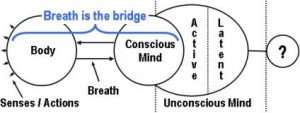You may ask yourself why do we need to learn how to breathe? Doesn’t the body know how to breathe by itself? Yes, but when we are under stress, we are not exactly in control of our breath, and when the breath starts to control us, things could turn out very unpleasant for us.
In yoga the breath is seen as the bridge between the body and mind
When trying to meditate it is extremely common to have tension in the muscles and a busy mind. The nervous system is the mediator between the tense body and the noisy mind. One of the best ways to regulate that nervous system, and affect the body-mind, is through the breath. This has been known by the Yogis for thousands of years, and has also come to be widely known in recent years by the modern medical and psychological community.
Research has found that the exhalation in particular activates the parasympathetic nervous system, which instigates the relaxation response in the body. The longer the exhalation the slower the heart beat, the more happy hormones are secreted and the more relaxed we become. The more relaxed we are, the better we perform, mentally and physically.
 Did you know that the standard respiratory rate for a healthy adult at rest is 12–20 breath?
Did you know that the standard respiratory rate for a healthy adult at rest is 12–20 breath?
Sometimes the stress builds up so gradually, that we are not aware of how it affects us physically. When we are stressed we tend to inhale more than we exhale. When we over-breathe without knowing it, our carbon dioxide levels in the blood drop and we get symptoms of hyperventilation: We start to feel tingles in the fingers, get the sensation of ‘about to faint’. We might then panic, the body goes into complete stress mode, releasing more stress hormones we might even get heart palpitations and digestive disorders as a result.
Breathing into a paper bag is handy to increase the carbon dioxide level again, but serves only as a band-aid.
It is recommended that you pay attention to your breath regularly during the day. Do you hold your breath when you reach for things, or try to open tightly screwed-down jars? Do you know you can reach further on exhalation and you have more strength if you kept on breathing?
 Another in
Another in teresting ‘breath fact’ is, that we INHALE when we get a fright and EXHALE when we see something beautiful.
teresting ‘breath fact’ is, that we INHALE when we get a fright and EXHALE when we see something beautiful.
Diaphragmatic breathing or belly breathing helps relaxation. Another benefit of belly breathing is that the diaphragmatic movement stimulates the vagus nerve, which is largely responsible for controlling the inflammation levels in our bodies. So deep breathing not only relaxes us, it directly boosts our immune system.
Below is a video clip of the amazing BKS Iyengar showing his breathing capacity.
